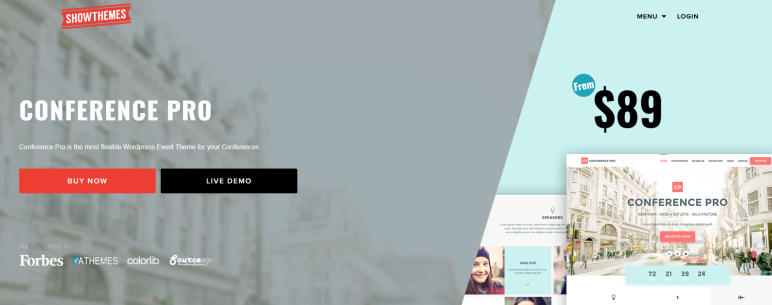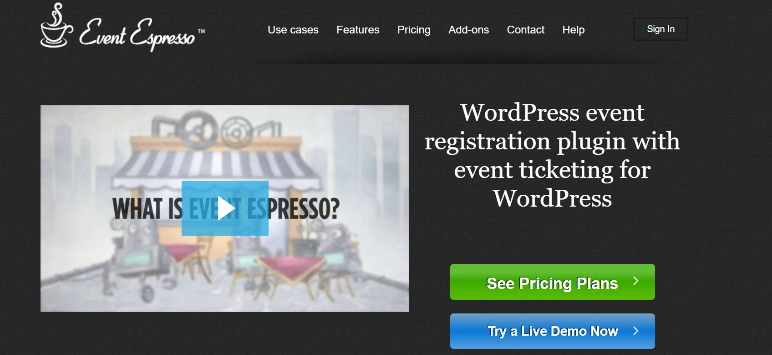
As an event organizer, you probably already know that putting on a great event requires a lot of planning and coordination. Many times the most challenging work – event registration and ticketing, marketing, organizer-staff coordination, payments – happens behind the scenes.
The good news is that your WordPress website can help you stay on top of things and organize a successful event if you have the right theme, plugins, and tools in your arsenal.
In this article, we’ll explain why WordPress is great for organizing events and share some hand-picked event themes, plugins, and tools to help you get started.
Self-Hosted vs Hosted Event Solutions
WordPress is a self-hosted solution which means that you have to purchase hosting, take care of site maintenance, stay on top of site security, and make sure your themes and plugins are up-to-date.
With a self-hosted platform like WordPress, you can install an event theme to your website to give it the look and feel you’re going for. You can also install as many plugins – free or premium – as you’d like depending on what sort of functionality you want to offer. You can also use CSS and HTML or a page builder to further customize your WordPress website.
The key benefit of a self-hosted platform is that you own all of your data. You don’t have to conform to third-party platform rules and regulations or worry about losing your data or having your account revoked.
Event Espresso is a premium event registration and ticketing plugin for WordPress that offers a number of event management features. It can help you create and sell tickets, collect payments, promote your events, and much more. Additionally, it enables your attendees to register online by filling out custom registration forms. You can also use it to accept group registrations and set up waiting lists.
Alternatively, you can go for a hosted event website solution – like Event Smart – which gives you the same features. The only difference is that you don’t have to find a hosting provider.
WordPress Event Themes and Plugins
Here are some popular WordPress event themes and plugins that can help you build an engaging event website:
Event Themes
#1: Barista

Barista is a Beaver Builder child theme built for Event Espresso 4. This theme is free for Event Espresso websites. It’s built on top of the Beaver Builder theme which is an adaptable framework for WordPress websites. To use this child theme, you’ll need to make sure that you have the Beaver Builder theme installed as a parent theme to your WordPress website.
#2: Conference Pro

Conference Pro offers a modern design that lets you quickly start creating your event. It comes with an easy-to-use, drag-and-drop interface that lets you customize the layout, fonts, and colors, or use its collection of shortcodes. Its built-in Event Composer lets you quickly drag-and-drop elements like contact forms, social media, speakers, and media galleries in a single click on one or more pages.
#3: OpenEvent

OpenEvent is another powerful and feature-loaded theme that lets you create and display events on your WordPress website. It’s a fast-loading, responsive, and user-friendly theme that lets you customize different elements including fonts and colors. Its event features include a countdown timer and social media displays.
These are some of our top suggestions but there are many event themes out there to choose from. Be sure to check out these articles for more event themes and use cases.
Event Plugins
#1: Event Espresso

Event Espresso is a premium WordPress event registration plugin with event ticketing features that powers over 40,000 event websites. It gives you access to a number of event features such as online payments, multiple ticket options, custom registration forms, discount codes, printable tickets, and event ticket scanning and attendance tracking app on your phone. Event Espresso is the perfect solution for classes, fundraisers, training, workshops, sporting, non-profit, social, or any other kind of event.
#2: WP Event Manager

WP Event Manager is a lightweight and fully responsive plugin that gives you access to event features like adding and managing event categories, sending RSS alerts to event attendees, and various event widgets. It also lets you create and manage events and allow attendees to easily submit their registration information.
#3: All-in-One Event Calendar

All-in-One Event Calendar is a useful event plugin that lets you publish your event listings directly on your WordPress website. It comes with a user-friendly interface that makes it easy to create an advanced website calendar system for your event site. You can choose to display your events based on day, week, or month view. It also gives you options to display recurring events, share events on Google Calendar, Apple, iCal and MS Outlook, and embed Google Maps on your event website.
Promoting Your Event With WordPress
Here are some of the most common tools used by event marketers to promote their events:
Email Marketing
To organize a successful event, most event marketers rely on email marketing to reach out to prospective attendees. In fact, around 40% of marketers consider email to be the single-most significant channel for promoting their events, and rightfully so.
Here are some popular email marketing tools that work seamlessly with WordPress:
- Mailchimp. Mailchimp is a powerful email marketing service that lets you easily turn your visitors into subscribers and event attendees. It comes with pre-built templates and segments to help you quickly create professional emails. Event Expresso’s Mailchimp integration lets you build a list of event attendees when they register for your events which you can use to run targeted email marketing campaigns.
- MailPoet. MailPoet helps you build a mailing list by collecting emails from your site’s visitors when they sign up for newsletters, all from within the WordPress admin. Its newsletter builder works seamlessly with WordPress, enabling you to create high-converting emails from scratch or by using built-in templates.
- Newsletter. With Newsletter, you can build email lists and easily create, send, and track emails. It comes with a drag-and-drop email composer, subscription widget, and single and double opt-ins.
Social Media Marketing
Social media marketing is a great way to get the word out about your upcoming event. You can use industry hashtags to promote your event.
For example, if you’re hosting a charity event for animals, you could include hashtags like #event #animalshelter #dogs #cats in your posts. It’s also a great platform for encouraging your followers to have conversations about your events and ask questions.
Here are some social media marketing tools that work with WordPress:
- Revive Old Posts. Revive Old Posts is a social media automation tool for WordPress that lets you show old and new WordPress event posts to users by automatically sharing them on social media platforms like Facebook, LinkedIn, Pinterest, Twitter, and Instagram. This helps you drive more traffic to your event site and improves audience engagement.
- HubSpot. HubSpot is a powerful social media automation platform that enables you to easily track brand mentions and related conversations, schedule your social posts for maximum viewership, and automatically monitor audience engagement.
Blog Posts and Landing Pages
Blog posts help you educate your site visitors about your events and landing pages can help you direct those visitors to your registration page.
Here’s how event blogging can help you promote your event:
- Blog about your cause. Writing blog posts and articles that explain the cause you’re supporting can help you reach out to your target audience. You can also share images, graphics, videos, and statistics through your blogs.
- Publish interviews with guest speakers. Interview guest speakers before the event and publish them as blog posts on your event website. You can ask the guest speakers to share the post with their followers on social media, enabling you to tap into their following.
- Have guest speakers write blog posts about the cause. You can get your guest speakers to write blog posts about the cause you’re supporting, explaining why it’s important to them. Or you might consider asking them to write a summary of their presentation and publish it on your event website after the event ends.
Here are some reasons why you need event landing pages:
- Lead generation. Landing pages are a great tool for generating leads for your events. Your landing page will help you collect contact information from your site’s visitors. This way, you’ll be able to reach out to more people while growing your email list.
- Increase awareness. A landing page with your company’s branding (such as logo and brand colors) can help you establish event brand awareness. As a result, you’ll build trust with your audience and they’ll be more likely to attend your events.
- Lead prospective attendees down the funnel. An event landing page acts as a sales page that encourages prospective attendees to take the next step. For example, you may ask visitors to fill out your event registration form or purchase tickets. You can also use this space to encourage them to check out your event blog or social media pages to learn more about the cause you’re supporting.
Conclusion
A WordPress event website can help you stay on top of event planning, management, and marketing activities. It will also help you build your brand presence, attract more attendees, and increase registrations.
What are some of the features you’re looking to offer through your event website? Let us know by commenting below.

